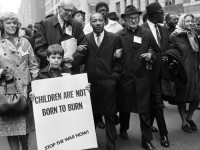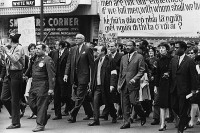



Martin Luther King Jr.’s charismatic “I Have a Dream” speech is emblazoned in our historical memories. But another address to a much smaller audience on April 4, 1967 at Riverside Church in New York is no less significant. There King demonstrated his deep understanding of how the system works. He moved beyond a simple race analysis to include class and foreign policy issues. He forcefully denounced the war in Vietnam. He called the U.S. “the greatest purveyor of violence in the world” and he deplored the “giant triplets of racism, extreme materialism and militarism.” Exactly one year later King was assassinated in Memphis where he had gone in solidarity with striking sanitation workers.
Dr. Martin Luther King, Jr, Nobel Peace Prize winner, is one of the 20th century's most enduring figures. He advocated and practiced civil disobedience and non-violence. He said, "Christ gave us the goals and Mahatma Gandhi the tactics." He rose to national prominence during the epic Montgomery bus boycott and then went on to spearhead a movement which ended juridical apartheid in the U.S. He was assassinated on the balcony of the Lorraine Motel in Memphis on April 4, 1968.
- KBOO


